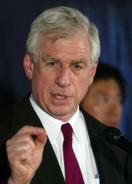U.S. puts forward proposal to break deadlock at Sudan peace talks
By TOM MALITI Associated Press Writer
 NAIVASHA, Sudan, Mar 19, 2004 (AP) — The United States has put forward a proposal to break a deadlock at peace talks between the Sudanese government and southern rebels fighting a 21-year civil war, the U.S. envoy to Sudan said Friday.
NAIVASHA, Sudan, Mar 19, 2004 (AP) — The United States has put forward a proposal to break a deadlock at peace talks between the Sudanese government and southern rebels fighting a 21-year civil war, the U.S. envoy to Sudan said Friday.
Former Sen. John Danforth said the last two months of negotiations between the warring parties have been disappointing, as the talks have stalled because of disagreements on how one of three disputed areas in central Sudan should be administered during a six-year interim period.
Sudanese government negotiators and the rebel Sudan People’s Liberation Army, or SPLA, have been discussing three so-called conflict areas – the Nuba Mountains, southern Blue Nile and Abyei – since January. They have reportedly made progress on two of the areas, but have been unable to make headway on the issue of Abyei, an oil-rich region 800 kilometers (500 miles) southwest of the Sudanese capital, Khartoum.
The rebels say Abyei should be part of southern Sudan and administered by a southern administration during the interim period, while the government is insisting the area should remain part of the north.
“We have had two months of disappointment,” Danforth said after meeting negotiators in the Kenyan town of Naivasha. “Because Abyei has been such a contentious issue and there appears to be a stalemate … necessity has dictated a more explicit approach for the U.S. with respect to solving the problem.”
The talks in Naivasha, 100 kilometers (60 miles) northwest of the Kenyan capital, Nairobi, are being mediated by the regional Intergovernmental Agency for Development, but the United States, Britain and Norway have observer status.
The negotiations had been making significant progress, with the parties agreeing in September on security arrangements during the transition period. In January, they also signed an agreement on how to divide wealth in Africa’s largest country.
The progress had been attributed in part to U.S. pressure, and it was hoped that the parties would have signed a comprehensive deal earlier this year. But there has been no agreement on any of the outstanding issues, which also include the make up of a transitional administration and whether Khartoum should be governed under Islamic or secular law.
In July 2002, shortly after the peace process began, the parties agreed to the six-year transition period during which the south will have a regional administration. After that period, southerners will vote in a referendum on whether to secede.
Under the U.S. proposal for Abyei, people living in that area would also vote in a referendum, with the choice of becoming part of the southern region of Bahr el-Ghazal or retaining “special administrative” status.
During the interim period, the region would have representatives in state legislatures in West Kordofan in the north and Bahr el-Ghazal in the south, as well as its own locally elected council.
The region’s oil revenue would be distributed between the national government, the southern administration, Bahr el-Ghazal and West Kordofan states and local communities.
SPLA spokesman Yasir Arman said the rebels were “not satisfied” the proposal, but said the group “can live with it.
“We are ready to sit down with the other party so as to reach a final solution for the Abyei problem,” he told The Associated Press.
It was not immediately possible to speak to government officials.
The war erupted in 1983 when southern rebels took up arms against the predominantly Arab and Muslim north, seeking better treatment for the south and for southerners to have the right to choose whether to remain part of Sudan. More than 2 million people have perished, mainly through war-induced famine, in the conflict.
In the last 12 months, an insurgency has also erupted in Darfur region in western Sudan, forcing more than 700,000 to flee their homes.
Danforth described the situation in Darfur as a “a true humanitarian disaster” and said that problem would have to be resolved before there can be normal relations between the United States and Sudan.
